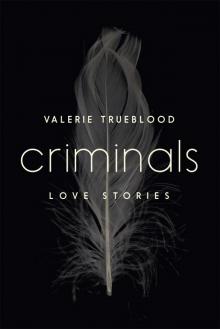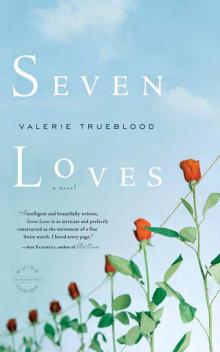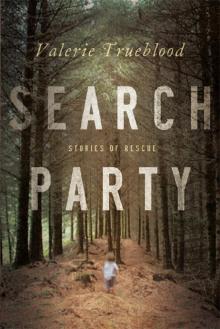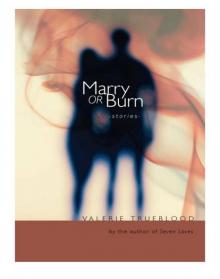- Home
- Valerie Trueblood
Seven Loves Page 20
Seven Loves Read online
Page 20
“Look at the gardens!” she said eagerly, seeing May glance at the little fence, but May refused to marvel, or give in and ask a question, she refused some acquiescence her mother wanted from her, some admission that her old childish longing at bedtime for everyone to be warm, fed, raised up where they had fallen, was only sleeping and not dead, now that she was in high school. Some word that she was still good.
“I’m glad you came with me,” her mother said gaily.
A scrubby bush was growing everywhere, with the lower branches pruned away to give it the appearance of a small tree. They came to a clearing full of sawhorses and planks, with kerosene drums flattened into sheets covering cans of paint and turpentine.
Several dogs wandered after a big black malamute, sniffing under its blowing tail. A skeletal cat threaded its way through piles of sawdust and slipped under one of the shacks.
Her mother knew where to go. It was only two o’clock in the afternoon but the sky was a deep, charged gray, with white cloud on it pulled thin like cheesecloth. The waterfront was already darkening. Through the smoke May could smell water, or seaweed, on the wind, or it might have been the sewage the tide was taking out from the five privies built out over the water on stilts. May knew about these. Five privies for five hundred men. The men teetered out to them on long, rickety gangplanks, and at night some of them fell off drunk onto the rocks.
Soon the afternoon would be at an end. She would live through whatever would be said and done in the next two hours, and then forget it. With all that was imposed on her and chosen for her and unimportant, it would disappear from her life, her real, beginning life.
Tomorrow was Sunday, she had a lab report to write. Her father said she should think about medicine, when she told him she had given up her idea of being a writer in order to pursue chemistry. Whatever she chose, whatever happened to her, she would not be compelled as her mother was. No, she would not be pressed into errands like her mother’s, unwanted mercies, hopeless schemes printed in leaflets.
In a little while she would go home, fall on her bed, lure from its hidden place inside her the look that had crossed Eugene’s face when he got his test back and moved his thumb to cover the grade. She would think of how she might have comforted him, now that his shirts weren’t starched and he couldn’t concentrate because his father had lost everything. “The poor child,” her mother said. Eugene a child! “His mother is Russian? And she came away from the Revolution?”
The lumberyard had closed down; Eugene’s father had a job cleaning the hardware store and another delivering for the druggist.
May cast a final look at the sky. The water in the Sound was an olive color, almost black, with no light on the peaking ripples. The mountains could not be seen, the pure white Olympics. The trailing clouds were gone; dark, molded rain clouds were moving in. There was a damp freshness above the smoke and coming up from below it, from the wet soot in which the huts sat like a field of toadstools after rain.
There were places like this in other cities, with the same name: Hooverville.
In front of the mirror, fastening her barrettes, she had told herself that it would not be at all the way her mother hoped. The men would not be expecting them, or they would be drunk or begin telling the kind of jokes you could hear at school, or they would simply not be there, in the shack big enough for six to live in where they were supposed to gather to hear her mother speak.
But the men were none of these things. They were heavy-footed and slow coming in, like men after hard work. A dozen or so right away squatted and sat on the floor, then ten or fifteen more pushed in as voices swelled outside. The last to squeeze in lined the walls until no more would fit, removing their stocking caps with a precise, exaggerated politeness, but quickly pulling them back down over their ears. They kept their gloves on. It was icy November; you could see your breath in the cabin. The ones who couldn’t fit in the room had the doorway and the narrow path to it blocked; there was no way you could get out now.
Sudden rain made a clatter on the tin roof and the men inside began to joke as water snaked down the wall behind May. At once the men standing outside hunched away, and the door was pulled shut.
While they were crowding onto the bunks, fishing in their pockets for tobacco, greeting each other warily, something sly settled over them, something May could feel. Some sour, ornery, restless expectation or wish.
“Ladies and gentlemen,” her mother said hoarsely, over the rain, and only then did May see that another woman was in the room, on the edge of one of the bunks, a short woman sitting so erect she was swaybacked, with short bushy hair and a big forward jaw like a drawer left open. She had her son beside her. After a while May saw that she had one leg draped over his. It was not her son but a man even smaller than she who tapped out a cigarette on her thigh and lit it for her while the others jostled and crowded them on the bunk. Unperturbed, the small man said in a singsong out of the corner of his mouth, right over her mother’s voice as though she weren’t speaking, “Blackjack, Wing’s place.”
She didn’t really listen to her mother. The rain released a strong smell of coffee grounds in the room, and of smoking lard, and now the air thickened as if those smells had been mixed with something a little sour, potash or chicken manure or old wet leaves raked up. The room had four bunks in it and a pile of bedrolls in the corner. There was a woodstove, unlit, made of bricks and coal-oil cans, with willow-pattern bowls just like the ones they had at home—maybe these were the ones from home—stacked on it, and a piece of ragged tin fashioned into a ladle. May had been given an upended washtub to sit on.
They had brought in a little plank table and placed a glass of water on it for her mother, and then a bowl of something that looked like an arrangement of pancakes, small, brown-edged, covered with flakes of black. “Like them cookies?” She jumped. A man in the front said, “Fried ’em on that there stove. Well? Eat ’em up.” May smiled stupidly and nodded; she took one and bit into it. It was like a pancake but it had even less sugar and was filled with grit.
Her mother had been invited. The man who had invited her was shy and his English was not good, May knew, so he was not the one who was going to introduce her. May figured out who he was because he seemed to be the youngest, and he bowed to her mother and sent her quick, signaling looks, pulling his too-short, foreign-looking sweater sleeves down when she glanced at him. He was slight and nervous but apparently he was popular among the men. It appeared that certain leaflets he translated and tacked up were considered a harmless joke. It was a joke to be a Communist at his age. He had black hair growing down his neck and sad black eyes, thickly lashed. Despite his coloring, in a vague way he reminded her of Eugene. He had the not-American nose, and carved, heavy, not-American lips.
The whole room seethed with scratching. They have lice, May said to herself with a sort of relish. She didn’t want lice but she had no fear of them; her head had been full of them in the fourth grade. Half the grades had had them. Carrie, in the seventh and wearing curls, had wailed and stamped; her long hair had to be cut. But ripping the hairs between finger- and thumbnail to strip off the nits: that had been a savage pleasure.
Her mother had not been talking for very long when a noise began in the room that sounded like the barking of seals.
May saw that the men were spreading their jaws in vast, loud, anguished male yawns that bathed the folds under their eyes and made them work their jaws to bring their faces back into position. They passed the fervent yawns along and fell silent only when her mother began to cough. At that, as if she had finally talked sense, they bowed their heads and plunged their fingers into their beards.
To May’s astonishment her mother was not speaking well. She kept hesitating and having to swallow, like a substitute at school. She drank repeatedly from the glass of cloudy water they had drawn for her from a tap by the sawhorses.
But eventually she steadied herself, threw her shoulders back. Her eyebrows drew together and that was a goo
d sign. The rain had thinned to a plinking. May found she could let her own breath out.
Suddenly tears sprang to her mother’s eyes, and with her hands she began to beckon and hush and urge the men in the room into some compact with her. She fixed her eyes on the ones in front who were listening, and stalked them until she was around in front of the little table, where there was hardly any room to stand, and she bent to the men sitting crosslegged on the floor and smoothed the air in front of them as if she were ironing. She was going into the litany May had heard so many times in their own living room, where it was possible to fall into a daydream and not even hear.
The men had settled down; their hands lay on their knees and they slitted their eyes and let their heads hang sideways as if they were listening to the radio.
May lifted one foot and then the other off the floor; the rim of the washtub bottom had begun to bite into her legs. The leaking water was creeping toward the men. Her mother was losing her voice but didn’t notice it; the words were pouring out of her now. “Why is there no bathhouse, when it would be easy to pipe water to a central building where you could bathe? That’s what the Emergency Relief Administration exists for, does it not? Why must you rustle everything you need to live, gather your bedding and be afraid to hang it out to dry, tramp miles in search of things everybody must have by right? By right,” she hissed through clenched teeth, her big eyes almost popping. May looked away. Her mother dropped her voice. “What—kind—of government—do we live under?—that makes you afraid of anybody who comes down here, afraid of me? Afraid I’ll put you on the tax rolls, or ship you out to labor camps. All over the country a hopeless quest is going on, not even for work anymore but for food and warmth, and going on in this city, in the rain, desperately! Ladies and gentlemen! Cold rain! Is there a human being who does not understand the words cold rain? And who comes here? The government, into your one life, and burns your homes!”
She looked straight at the young man who had invited her, who had flushed right to the neat, flat earlobes below his wool hat. “Oh, how hateful our country is!” she cried out. “How abominable. How it has cut men and women off in their one life. Our—motherland!” There she stopped, and smiled her wide flashing smile, and held up her arms despairingly, comically, her shirtwaist coming untucked. A few of the men smiled back, with what May saw was embarrassment for her in her disarray.
So that was what the little barrows were for. The men went out pulling wagons, the way May had when she collected things for her hideout in the chicken house. One life. The words, heavy as full buckets, settled in her. One life. The one in this room. To wait to grow up . . . to grow up . . . and be sent back. To go out again pulling a wagon.
Why live? May looked at the sharp tin ladle. You could cut your wrists. Did anyone here do that? Why live? What kept you living, freezing and wet in a box on legs? Ugly, smelly, hidden from sight. What kept you living at all, going on and on, obedient, like a bobbin spinning with the thread used up? What were they all obeying? Was it no more than life? Just life made you do this? Life made you live?
Her mother had paused. She closed her fingers around the glass and drank the last of the water. May waited, rubbing her cold hands in her lap.
They had put her behind her mother on the washtub by herself, facing the men. Every time she looked straight at them she felt her face burn. The cigarette smoke had made her eyes run. She had taken off her gloves to rub her eyes but she did not want them to think she was crying.
A man got to his feet, wobbling. “I’ll tell you another thing, ma’am.” He pointed shakily at her mother. “We had all our cats . . . our cats to die.” He rocked back on his heels as his friends steadied him. “Got sick, didn’ they, boys? It was the city. Hadda bury sixty-some. What kind of a thing? You see what I mean? No cats, you got rats. Unsanitary. See that?”
“So they done it! Burned it down!” the big-jawed woman on the bunk shouted out in a surprising treble voice. “Got rid of the rats!”
“You may be right.” Her mother was calm again, May could see. It did not worry her mother when she was in this state that a whole room was stirring, that men’s eyes had begun to narrow and burn. Now she wanted them to say what they had been or done before they came here to live. That brought on a low growling in the room.
A man identified himself as a housepainter, and then a switchman spoke up, and several men who had been loggers. A man on the bunk said he had been a pipe fitter. A tall man lounging against the door broke in loudly. “Looky here. This here Fili-pine feller’ll sew you a burlap bag. He’ll make a goddamn bag and goddamn if somebody won’t pay him for it.” He put out his cowboy boot, with the little toe sticking out of a hole, and prodded a small man on the floor.
“I hap sewing machine,” the man said cautiously, looking straight in front of him.
But they tired of this. They started grinning at each other. May was surprised that she could tell this while her mother did not seem able to: they were making things up. “I was a dance instructor,” one said, crooking his little finger.
“Served a term in Congress, he did,” called an old man with a squashed nose, jerking his thumb at the man with the cowboy boots. “Didn’t ya?”
“Sexual congress,” the man said, with his thumbs on his pocket flaps. This was a man May would have said was old, by his gray hair and drooping, wrinkled ears, but as she stared at him he unfolded his long legs and turned his boot at the ankle for the second time for her to see, as if his foot, and dirt and lice, and the smell of himself and the others in the room would have some secret appeal to her.
“Nice hat you got on,” he said across the crowd, rubbing his chin seeded all over in silvery stubble. He shot a look out of his eyes at May as vivid as a sniff of turpentine. “Come over here a minute,” he mouthed.
“No,” she mouthed back, turning her head.
He was the one who came or was shoved forward at the end—there must have been a bet—and leaned down and kissed her mother. “Much obliged for the speech,” he said. “Like you to have a token of my appreciation—” And wheezing he put his hand with the skin in bands like a chicken foot on hers, with his weight behind it to keep her wrist on the table. He cocked his matted head and pushed his lips out from under the mustache to meet hers. Her chapped sore lips. He made a loud, theatrical, smooching noise.
“Sir!” her mother said when he was done, with her free arm drawing May up from the washtub and close to her. “Here”—she smacked the papers—“is material for a meeting you may hold if you like, to organize this camp and demand what the city owes you, and if you don’t want to do that, I leave it to you.”
In the 1950s, when May took her own daughters to see Maureen O’Hara on the screen, proud and fiery but not forbiddingly pure, she would think of the men looking at her mother in that room, and of how carefully her mother had slid her arm out from under the man’s until her hand met his and gripped it so that she could give it her strong handshake. How she stood up straight, and did not wipe off her lips where May could feel the kiss still printed, or show any recognition of the frog odor rising from the grooves of the man’s corduroy, mixed with the smell of the bedrolls and of certain other men who had closed into a circle around them—a deep, burnt, throat-filling, vegetable smell that May had thought was moldy leaves until she identified it halfway through the meeting as urine, old urine.
The men who had closed in did not shake the hand her mother held out but fell back from her at that moment. It was over then. Ahead of them was only getting out, getting up the hill to the streetcar.
All of May’s life, women speaking at rallies would say that moments like this one, when men fell back, showed the power of a woman of conviction. Yet it was bitter to her mother and May knew it, when they all stepped away from her and stopped listening, if they had been listening, and slumped again, and yawned. It brought her to tears.
Why did you do it, then? May cried silently. Why do you have to?
The young man, the
Communist, walked with them a little way. He took her mother’s hands and pressed them to his chest. “Thank you,” he said in a whisper, shaking his head and grimacing. He was nothing but a boy, Carrie’s age. “You see, we—you see”—but his strong lips twisted down at the corners and this May did not want to see, nor her mother raising her plaid sleeves to take the boy in her arms. But her mother was only loosening her bag to pull out an envelope. Why had May seen an embrace, an embrace turned from, though natural as a habit long established?
She decided to ask her mother. Tell me about that boy. I have a right to know. But she didn’t do it that day; she never did it.
When she herself was old, May wondered if her mother knew all along that she had married a man who could forget her in a year. But why not forget? Why remember on and on? Why, instead of stopping, never stop?
Her mother closed the boy’s hand around the envelope. “Listen to me. I promise you you’ll get out of here. You’ll work. I promise you.” When they had gone a few steps she turned and called to him. “Kolya! Do you understand? Don’t be afraid.” He was standing there without waving.
“Charity is a trick,” said May under her breath as they walked. She shrank from the look her mother gave her.
It was four o’clock, as they had promised her father, and now the west-facing walls were painted with a full wet brush of brass-color by the sun going down.
The mud sucked at their boots and two policemen at the top of the sidewalk waved at them, a mocking wave. May kept turning back to look at where they had been, and out at the water, which seemed not to move on the surface but only to shift from below like rice in a strainer. From above, the mud lay in veins of orange and lead-blue between the shacks. Now that she had been there May could see the dark forms of men everywhere, sitting on overturned crates and basins outside the doors.

 Criminals
Criminals Seven Loves
Seven Loves Search Party
Search Party Marry or Burn
Marry or Burn